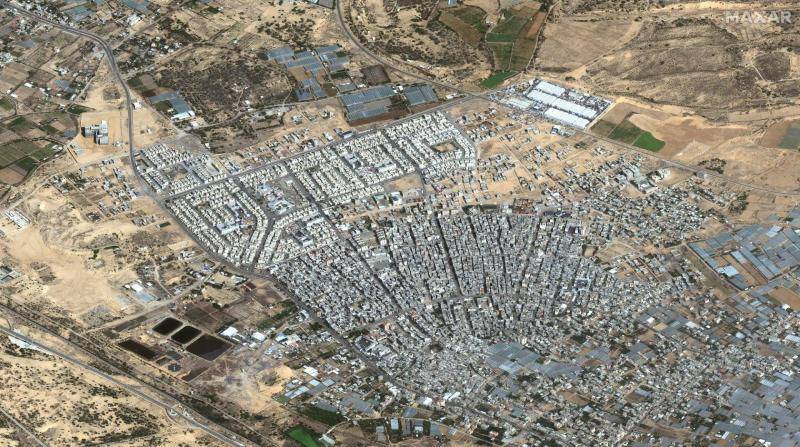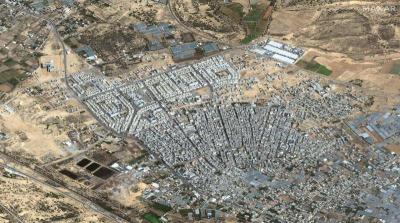Four officials familiar with Israeli plans stated that Israel expects to continue comprehensive military operations in the Gaza Strip for another six to eight weeks as it prepares for a ground invasion of the city of Rafah in the southern part of the Palestinian territory. The officials, which include two Israelis and two others in the region who requested anonymity for candid discussion, noted that military leaders in Israel believe they can inflict significant damage on what remains of the capabilities of Hamas during this period, paving the way for a transition to a less intensive phase of targeted airstrikes and special operations.
Avi Melamed, a former Israeli intelligence official and negotiator during the first and second Palestinian intifadas in the 1980s and the early 2000s, stated that there is little chance the government of Prime Minister Benjamin Netanyahu will respond to international criticism and cancel the planned ground attack on Rafah. He added, "Rafah is the last stronghold of Hamas control, and there are still brigades in Rafah that Israel needs to dismantle to achieve its goals in this war."
Israeli Defense Minister Yoav Gallant said on Friday that the army plans operations in Rafah targeting Hamas fighters, command centers, and the movement's tunnels, but did not specify a timeline for the campaign. He confirmed that "extraordinary measures" are being taken to avoid civilian casualties. In a press conference, he stated, "There were 24 brigades in Gaza, and we have dismantled 18 of them. Now, Rafah is the next center of gravity for Hamas."
World leaders fear a humanitarian disaster. Over a million Palestinian civilians are trapped between Israel and Hamas in the city on the border with Egypt, with no place left to flee after having been displaced from the onslaught of Israeli attacks that have destroyed a large part of the enclave. Last week, amid high diplomatic tension, U.S. President Joe Biden called Netanyahu twice to warn him against launching a military operation in Rafah without a reliable plan to ensure civilian safety. Netanyahu himself stated that civilians would be allowed to leave the combat zone before the attack, promising to achieve "the clear victory."
The Israeli army has not clarified how it will move over a million people among the rubble of the enclave. According to an Israeli security source and an international relief official, who requested anonymity, Gaza residents may be screened to remove any Hamas fighters before directing them northward. A separate Israeli source indicated that Israel might also build a floating dock north of Rafah to allow access for international aid and ships equipped as hospitals by sea. However, an Israeli defense official stated that Palestinians would not be allowed to return to northern Gaza collectively, leaving the sparsely vegetated land around Rafah as an option for temporary camps. The two regional officials also mentioned that it would not be safe to move a large number of people to an area in the north of the enclave that has no electricity or running water and has not been cleared of unexploded ordnance.
Several officials aware of discussions between the governments indicated that Washington is skeptical that Israel has made adequate preparations for the safe evacuation of civilians. Biden stated on Friday that he does not expect an "all-out" Israeli ground invasion soon. Furthermore, Hamas sees the clear victory promised by Netanyahu as neither quick nor easy. A Hamas official residing in Qatar told Reuters that the movement estimates it has lost six thousand fighters in the ongoing four-month conflict, about half the number that Israel claims to have killed, which is twelve thousand. The official, who requested anonymity, stated that the movement that governs Gaza can continue to fight and is prepared for a long war in Rafah and Gaza. He said, "Netanyahu's options are tough, and our options are tough; he kills and can occupy Gaza with justification, but at the same time, Hamas is resilient and fighting. He has not achieved his goals of killing the military leadership and exterminating Hamas."
"There is no empty place in Rafah." Hamas reignited this round of confrontations after its fighters launched an attack on southern Israel on October 7, resulting in 1,200 deaths and the capture of 253 hostages. In response, Israel launched a massive campaign that has resulted in over 28,000 Palestinian deaths. Israeli attacks have destroyed vast areas of the enclave. Fighting continues in the city of Khan Yunis to the south, while sporadic clashes continue in the northern areas that are supposed to have been cleared.
More than 85% of Gaza's population of 2.3 million is now homeless. Most of the displaced have fled to Rafah, which had an estimated pre-war population of about 300,000. Imad Joudat (55), who was displaced early in the war with his family from Gaza City, where he ran a furniture business, said, "There is no empty place in Rafah; there are over a million and a half people here, does the world know this?" The father of five, living in a tent city without food or water in Rafah, added, "I am responsible for a large family. I feel helpless because I don’t know where I should go with them if an invasion occurs."
Egypt has closed its borders with the enclave. Cairo insists on its opposition to the displacement of Palestinians from Gaza amidst broader Arab rejection of any repetition of "the Nakba," during which 700,000 Palestinians fled or were forced from their homes during the 1948 war that accompanied the founding of Israel. Three Egyptian security sources told Reuters, requesting anonymity due to the sensitivity of the matter, that Egypt is paving an area along the Gaza border that can be used to shelter Palestinian refugees as an emergency measure if an Israeli attack on Rafah leads to mass displacement across the border. However, the Egyptian government has denied making any such preparations.
Israeli Defense Minister Gallant stated that Israel has no intention of evacuating Palestinian civilians to Egypt.
**"A Commitment to the Victims"**
Melamed, the former Israeli intelligence official, indicated that the only potential delay of the Israeli attack on Rafah could occur if Hamas made concessions in negotiations and released hostages taken on October 7. He added, "Even then, this would only delay progress towards Rafah unless accompanied by disarmament in the city and the surrender of Hamas brigades there." A senior security official in the region mentioned that Israel believes some Hamas leaders and hostages are present in Rafah.
This month, after weeks of negotiations, Hamas proposed a ceasefire of four and a half months during which all Israeli hostages would be released while Israel withdraws its forces from the Gaza Strip and reaches an agreement to end the war. Netanyahu rejected the offer, describing it as "illusory." A new round of talks involving the U.S., Egypt, Israel, and Qatar aimed at reaching a ceasefire concluded on Tuesday in Cairo without achieving a breakthrough. U.S. sources indicate that senior U.S. officials see reaching an agreement to release remaining hostages in exchange for a long-term ceasefire as the best way to pave the way for broader negotiations. They added, however, that they are concerned that such an agreement may not materialize in the coming weeks and that the war may continue until Ramadan, potentially intensifying global criticism of the Israeli campaign.
Achieving a comprehensive agreement to end the conflict appears distant. According to several regional sources, including those from Hamas and the Palestinian Authority, any attempt to form a government to administer Gaza post-war would only succeed if it gained Hamas's approval, as the movement ousted the Palestinian Authority from Gaza in 2007. However, the status quo cannot continue as before.
Israel is committed to eliminating Hamas. The movement and officials in the region have stated that Hamas and its leader in Gaza, Yahya Sinwar, will fight to the death rather than surrender or live in exile. Israel remains opposed to any agreement that includes a permanent ceasefire or the establishment of a Palestinian state, despite U.S. pressure and international protests condemning the suffering of civilians in Gaza and the lack of progress towards a lasting peaceful resolution.
Since October, U.S. Secretary of State Antony Blinken has visited the region five times. Last month, the U.S. State Department stated that Washington "actively seeks the establishment of an independent Palestinian state" with security guarantees for Israel and is exploring options with partners in the region. British Foreign Secretary David Cameron also told parliament members that Britain and its allies "will consider the issue of recognizing the Palestinian state, including at the United Nations." However, Israel, the United States, and Britain have not officially recognized Palestine, unlike nearly 140 other countries in the United Nations.
Nevertheless, for Netanyahu and many other Israeli officials, discussions of a two-state solution equate to betraying the victims of the October 7 attacks. Israeli Culture Minister Miki Zohar stated on social media last month, “I say clearly to anyone still stuck in October 6: We will never extend a helping hand to establish a Palestinian state.” He added, "This is our commitment to the victims of the sacred killings."




